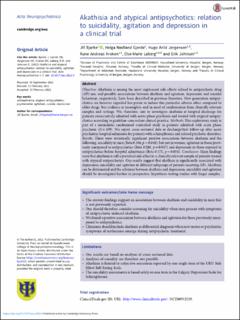| dc.contributor.author | Bjarke, Jill Kristin | |
| dc.contributor.author | Gjerde, Helga Nødland | |
| dc.contributor.author | Jørgensen, Hugo A | |
| dc.contributor.author | Kroken, Rune Andreas | |
| dc.contributor.author | Løberg, Else-Marie | |
| dc.contributor.author | Johnsen, Erik | |
| dc.date.accessioned | 2022-08-05T13:47:50Z | |
| dc.date.available | 2022-08-05T13:47:50Z | |
| dc.date.created | 2022-04-10T16:35:52Z | |
| dc.date.issued | 2022 | |
| dc.identifier.issn | 0924-2708 | |
| dc.identifier.uri | https://hdl.handle.net/11250/3010407 | |
| dc.description.abstract | Objective: Akathisia is among the most unpleasant side effects related to antipsychotic drug (AP) use, and possible associations between akathisia and agitation, depression and suicidal behaviour, respectively, have been described in previous literature. New generation antipsychotics are however regarded less prone to induce this particular adverse effect compared to older drugs, but evidence is incomplete and in need of confirmation from clinically relevant samples and settings. We, therefore, aim to investigate akathisia at hospital discharge for patients consecutively admitted with acute-phase psychosis and treated with atypical antipsychotics according to guideline-concordant clinical practice. Methods: This exploratory study is part of a naturalistic randomised controlled study in patients admitted with acute phase psychosis (N = 109). We report cross-sectional data at discharge/first follow-up after acute psychiatric hospital admission for patients with schizophrenia and related psychotic disorders. Results: There were statistically significant positive associations between akathisia and the following; suicidality in men (Beta 0.306, p = 0.048), but not in women; agitation in those previously unexposed to antipsychotics (Beta 0.288, p = 0.047) and depression in those exposed to antipsychotics before hospital admittance (Beta 0.375, p = 0.031). Conclusion: Main findings were that akathisia is still a prevalent side effect in a clinically relevant sample of patients treated with atypical antipsychotics. Our results suggest that akathisia is significantly associated with depression, suicidality and agitation in different subgroups of patients receiving APs. Akathisia can be detrimental and the relations between akathisia and depression, suicidality and agitation should be investigated further in prospective, hypothesis-testing studies with larger samples. | en_US |
| dc.language.iso | eng | en_US |
| dc.publisher | Cambridge University Press | en_US |
| dc.relation.uri | https://doi.org/10.1017/neu.2022.9 | |
| dc.rights | Navngivelse 4.0 Internasjonal | * |
| dc.rights.uri | http://creativecommons.org/licenses/by/4.0/deed.no | * |
| dc.title | Akathisia and atypical antipsychotics. Relation to suicidality, agitation and depression in a clinical trial | en_US |
| dc.type | Journal article | en_US |
| dc.type | Peer reviewed | en_US |
| dc.description.version | publishedVersion | en_US |
| dc.rights.holder | Copyright 2022 The Author(s) | en_US |
| cristin.ispublished | true | |
| cristin.fulltext | original | |
| cristin.qualitycode | 1 | |
| dc.identifier.doi | 10.1017/neu.2022.9 | |
| dc.identifier.cristin | 2016530 | |
| dc.source.journal | Acta Neuropsychiatrica | en_US |
| dc.identifier.citation | Acta Neuropsychiatrica. 2022 | en_US |

